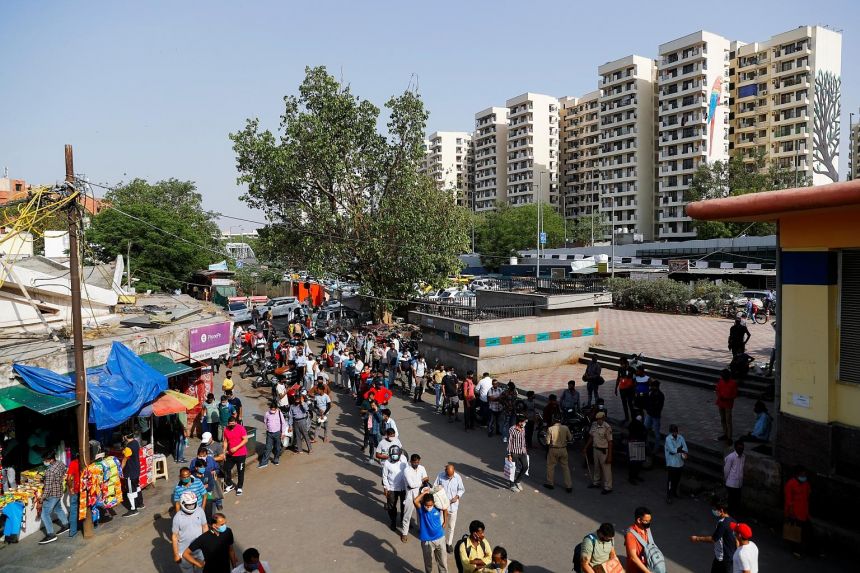Calls for liquor home delivery in India amid Covid-19 but challenges remain
Sign up now: Get ST's newsletters delivered to your inbox

A queue for liquor after the Delhi government ordered a lockdown in the city, on April 19, 2021.
PHOTO: REUTERS
Follow topic:
BANGALORE - A salesman in a liquor store in the Jangpura neighbourhood of New Delhi, known to his regulars as Mr Bhatti, laughed on the phone when asked if they do home delivery.
"The government has announced it, but they have not permitted it," he said, describing succinctly Delhi's keen but confusing plans to allow home delivery of alcohol.
The capital city has been under lockdown since April 19 to curtail transmission of the coronavirus.
It was ravaged in the second wave this year, with around 28,000 cases of Covid-19 and more than 250 deaths recorded a day in April.
Patients flooded hospitals and oxygen ran out.
However, with the number of cases shrinking, the Delhi government has started to gradually lift movement restrictions from June 7.
Markets, grocery shops and malls can open on alternate days.
Liquor stores follow the same rules, but have requested the Delhi government to also allow home delivery to prevent large crowds.
Delhi amended state excise rules on June 1 to permit home delivery, and it came into effect - technically - on Friday (June 11).
But as Mr Bhatti put it: "It is good news that is of no use to anyone yet."
Mr Pritam Pal Singh, a member of the Aam Aadmi Party, which runs the Delhi state government, said: "Online purchases will be allowed on a mobile app, which we will build soon. But not yet. Liquor vendors have to first apply for a licence for home delivery service."
Buying booze online in India is not as easy as buying bread and eggs.
Until the pandemic, excise rules in most states explicitly prohibited home delivery.
But after people crowded outside alcohol shops in violation of Covid-19 protocols in 2020, India's apex court advised states to consider home delivery of liquor.
Many state governments are heavily dependent on alcohol sale revenue but are reluctant to make liquor so easily accessible to the people.
On May 27, 2020, after a two-month closure during the first wave of the pandemic, the Kerala State Beverages Corporation launched BevQ, an online queue management mobile app to restart liquor sales without having crowds at the outlets.
BevQ gave registered users queue tokens for liquor stores in a 15km radius around their neighbourhood.
Each user got a 15-minute slot to visit a store to buy liquor.
Around 300 shops and 900 bars were enlisted, and 200 million users registered. About 250,000 tokens were given out a day.
Faircode Technologies, which developed the app, tried to add elements such as online payments and "click and pick" (where the customer can look at available stock, place an order and pick up the bottles at a designated time), but the government overruled it.
Mr Rajith Ramachandran, co-founder of the start-up, realised then that BevQ was never meant to be a consumer app, but a crisis management one.
"The app was not user friendly, not due to technological difficulties, but because of alcohol sale policies in India. Home delivery is easy to add, but the government doesn't want alcohol to be that easily available," he said.
As liquor stores in Kerala have closed again from April 27 following the second wave, the state might restart BevQ, but has ruled out home delivery.
"The alcohol consumer market in India is not even - there are millennial tipplers, two-pegs-an-evening folks and also dangerous drunkards who are given to domestic violence or drink driving. So, you can't have a system where just anyone can scroll through liquor brands and quantity and just order," said an alcohol manufacturer who did not want to be named.
The experience of other states shows that sending liquor to door steps is complicated but not impossible.

"Mumbai and Kolkata are good examples of home delivery of liquor happening without any bad outcomes," said Mr Vinod Giri, director-general of the Confederation of Indian Alcoholic Beverage Companies.
But steep delivery charges in the cities have been a deterrent.
In Chhattisgarh and Maharashtra, alcohol is delivered through restaurant and grocery aggregator apps, but the latter are keeping off Delhi for the moment till the rules are clearer.
Beverage industry experts say that safeguards are needed to prevent minors from purchasing alcohol, reduce excessive drinking, and curb adulteration.
States may also want to block cross-border sales.
Pending these sober measures, alcohol lovers will have to hold their drink.

